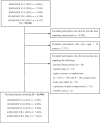Determining the reasons for unmet healthcare needs in South Korea: a secondary data analysis
- PMID: 33743725
- PMCID: PMC7981839
- DOI: 10.1186/s12955-021-01737-5
Determining the reasons for unmet healthcare needs in South Korea: a secondary data analysis
Abstract
Background: "Unmet healthcare needs" refers to the situation in which patients or citizens cannot fulfill their medical needs, likely due to socioeconomic reasons. The purpose of this study was to analyze factors related to unmet healthcare needs among South Korean adults.
Methods: We used a retrospective cross-sectional study design. This nationwide-based study included the data of 26,598 participants aged 19 years and older, which were obtained from the 2013-2017 Korea National Health and Nutrition Examination Surveys. Using multiple logistic regression models, we analyzed the associations between factors that influence unmet healthcare needs and participants' subgroups.
Results: Despite South Korea's universal health insurance system, in 2017, 9.5% of South Koreans experienced unmet healthcare needs. In both the male and female groups, younger people (age 19-39) had a higher odds ratio (OR) of experiencing unmet healthcare needs compared to older people (reference: age ≥ 60) (men: OR 1.83, 95% confidence interval [CI] = 1.35-2.48; women: OR 1.42, 95% CI 1.12-1.81). In particular, unlike men, women's unmet healthcare needs increased as their incomes decreased (1 quartile OR 1.55, 2 quartiles OR 1.29, 3 quartiles OR 1.26). Men and women showed a tendency to have more unmet healthcare needs with less exercise, worse subjective health state, worse pain, and a higher degree of depression.
Conclusions: The contributing factors of unmet healthcare needs included having a low socioeconomic status, high stress, severe pain, and severe depression. Considering our findings, we suggest improving healthcare access for those with low socioeconomic status.
Keywords: Anderson’s Behavioral Model of Health Services Use; Korean National Health and Nutrition Examination Survey; Socioeconomic status; Unmet healthcare needs.
Conflict of interest statement
The authors declare that they have no competing interests.
Figures
Similar articles
-
Association between the severity of new-onset depression and unmet healthcare needs of South Korean adults.PLoS One. 2021 Aug 19;16(8):e0256222. doi: 10.1371/journal.pone.0256222. eCollection 2021. PLoS One. 2021. PMID: 34411139 Free PMC article.
-
Understanding reasons for unmet health care needs in Korea: what are health policy implications?BMC Health Serv Res. 2018 Jul 16;18(1):557. doi: 10.1186/s12913-018-3369-2. BMC Health Serv Res. 2018. PMID: 30012117 Free PMC article.
-
Factors affecting unmet healthcare needs of older people in Korea.Int Nurs Rev. 2013 Dec;60(4):510-9. doi: 10.1111/inr.12055. Epub 2013 Aug 15. Int Nurs Rev. 2013. PMID: 24251942
-
Unmet healthcare needs in Southeastern Europe: a systematic review.J Med Access. 2024 May 23;8:27550834241255838. doi: 10.1177/27550834241255838. eCollection 2024 Jan-Dec. J Med Access. 2024. PMID: 38799085 Free PMC article. Review.
-
Hearing Loss and Healthcare Access among Adults.Semin Hear. 2021 Feb;42(1):47-58. doi: 10.1055/s-0041-1726000. Epub 2021 Apr 15. Semin Hear. 2021. PMID: 33883791 Free PMC article. Review.
Cited by
-
Deconstructing subjective unmet healthcare needs: a South Korean case study with policy implications.Front Public Health. 2024 May 10;12:1385951. doi: 10.3389/fpubh.2024.1385951. eCollection 2024. Front Public Health. 2024. PMID: 38799680 Free PMC article.
-
Universal health coverage in the context of population ageing: catastrophic health expenditure and unmet need for healthcare.Health Econ Rev. 2024 Jan 30;14(1):8. doi: 10.1186/s13561-023-00475-2. Health Econ Rev. 2024. PMID: 38289516 Free PMC article.
-
Association between Perceived Activity Restriction Due to People's Perception of Aging and Unmet Medical Needs among Middle-Aged and Elderly People: A Population-Based Study.Medicina (Kaunas). 2024 Jan 2;60(1):87. doi: 10.3390/medicina60010087. Medicina (Kaunas). 2024. PMID: 38256348 Free PMC article.
-
Unmet Healthcare Needs and Related Factors Among Immigrants: A Cross-Sectional Secondary Analysis of 2019 Korea Community Health Survey Data.Inquiry. 2023 Jan-Dec;60:469580221146828. doi: 10.1177/00469580221146828. Inquiry. 2023. PMID: 36625003 Free PMC article.
-
Symptoms of depression and anxiety, and unmet healthcare needs in adults during the COVID-19 pandemic: a cross-sectional study from the Canadian Longitudinal Study on Aging.BMC Public Health. 2022 Dec 1;22(1):2242. doi: 10.1186/s12889-022-14633-4. BMC Public Health. 2022. PMID: 36456993 Free PMC article.
References
-
- Gulliford M. Equity and access to healthcare. Access healthcare. 2003;36–60.
-
- Reinhardt U, Cheng T. The world health report 2000-Health systems: improving performance. Bull World Health Organ. 2000;78(8):1064. - PubMed
MeSH terms
LinkOut - more resources
Full Text Sources
Other Literature Sources



